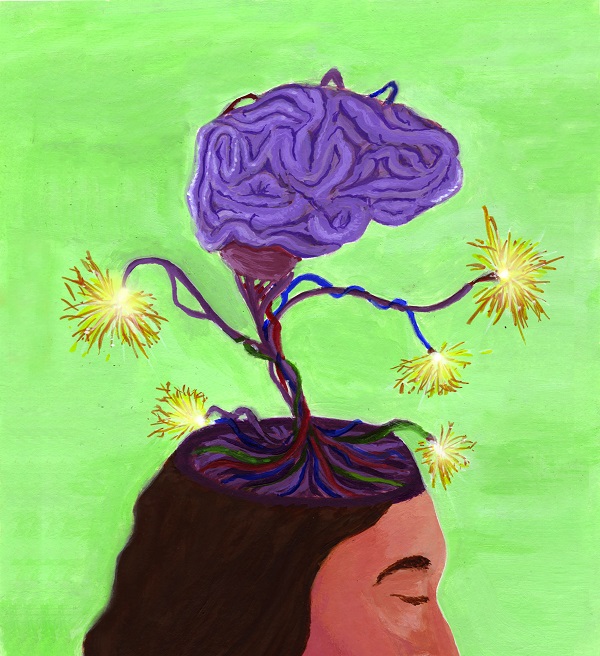The Human Brain: GL.TCH?
Illustrated by Tobias Avison
In the course of our planet’s history, we ourselves, as humans, are glitches. We stand out. We were the last to evolve. We are at the top of the food chain—not because of our superior strength but because of our intelligence. Unlike other animals, we build structures that last centuries, even millennia. We have left our footprint on this planet, and continue to do so. Yet we also have the ability to destroy one other.
 Our intelligence seems to be our defining glitch that makes us deviate from the rest of the animal kingdom. Yet are we as intelligent as we might like to think we are? For instance, did we mean to invent ways to destroy the world? Or are we just not smart enough to realize the consequences of our actions?
Our intelligence seems to be our defining glitch that makes us deviate from the rest of the animal kingdom. Yet are we as intelligent as we might like to think we are? For instance, did we mean to invent ways to destroy the world? Or are we just not smart enough to realize the consequences of our actions?
Even with our unique intelligence, humans make mistakes everyday: we judge people too quickly, we procrastinate, we are hypocrites, we don’t like it when someone contradicts our beliefs, and more. Most of these glitches, and others, can be traced back to our brain and its basic instincts, which lead us to respond to the world in automatic ways we might not even be aware of. For example, we tend to judge a person by their outward appearances and behaviour because of a shortcut in our brain for deciding, at a glance, if a person is dangerous or not.
Another example is our startle reflex, causing us to jump and cover our ears in case of a loud noise. This reaction comes from the brain stem, the part of our brain that developed first millions of years ago. It helps us to protect our head and neck in case of a threat.
In this way, we can see that we are almost “hardwired” to glitch, to make mistakes, to react in ways that may not fit with the context in which we find ourselves.
In addition, although we should learn from our mistakes, we don’t always learn unless that mistake has been made several times—and even then, we don’t always absorb the lesson, again perhaps because of our human nature to respond to the world in certain ways, even when those ways stop making sense. Our difficulty breaking from certain automatic patterns to learn important lessons could be considered a glitch as well, and could explain our difficulty as a species in ending war, refraining from harmful levels of pollution, etc. Maybe we are not so much smarter than the rest of the animal kingdom after all. In some ways, our brains may even make us less intelligent, in the sense that we may wind up doing more harm than any other species to our own long-term survival.
The good news is that our brains are so complex and still so unknown to us that our explorations towards a better understanding of our own brain and mind can help reveal our biological glitches and help us improve them. I can start with recognizing my own mental patterns and trying to transcend them. For instance, when I don’t agree with someone, I resist the bias most people have towards their own point of view, and I try to understand what would make the other person think that way and where their claim might be coming from, instead of simply rejecting their idea entirely.
Sources and other links
- Brain Games, National Geographic Channel, television series, 2011 – today
- “4 mistakes that are built into your brain”, http://tinybuddha.com/blog/4-mistakes-that-are-built-into-your-brain/
- Neurosciencenews.com
- https://www.youcubed.org/think-it-up/mistakes-grow-brain/
- http://www.psychologicalscience.org/index.php/news/releases/how-the-brain-reacts-to-mistakes.html

Comments
No comments posted yet.
You have to be registered and logged in in order to post comments!